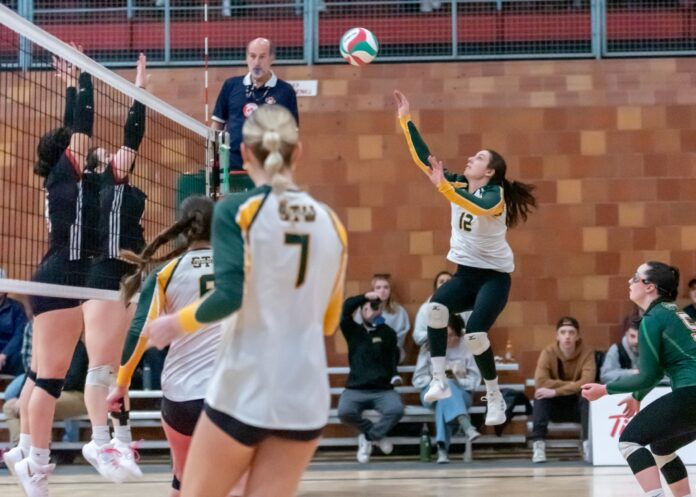
This past January, the National Collegiate Athletic Association (NCAA) Playing Rules Oversight Panel met to discuss the potential of changing several new rules around women’s volleyball. In late February, the panel officially approved new rules, which included allowing one of the most controversial rules in the sport to be changed — the double touch rule.
The double touch rule allows the setter to touch the ball twice in quick succession. The Oversight Panel thought that eliminating the rule would bring more consistency to the game and help to promote the continuation of play from one set to the next.
While some NCAA players have taken to social media to voice their opinions, the STU women’s volleyball team members were also slightly surprised by the decision.
First-year setter Jenna Murphy said that she was “kind of confused” since the rule is a critical part of volleyball.
“It was something that I didn’t think they would change,” said Murphy. “But the more that I thought about it, [the rule will] just bring more consistency to the game because all refs call different things as double touches.”
“I think overall just getting rid of them will make the game more consistent and they’ll make it flow better, which is what [they are] trying to do for the volleyball leagues.”
Murphy doesn’t think it will drastically affect all players, but will mainly impact the setters or whoever gets the second touch on the ball. She’s curious to see if it will affect how the setters set the ball, potentially by putting a spin on it so the hitters can gain more speed on the ball.
“I think it’d be really interesting and I think it’ll develop [a] setter’s IQ to be even higher than they have to be.”
Carys Storey has been an assistant coach with the STU women’s volleyball team for nine years and she agrees with the rule change.
“We’ve been teaching not to carry a ball, what the double touch is and not to do it in a game. But then you would get into a game and some refs call it [consistently] and others let it go,” she said.
“It shouldn’t be subjective, but it should be consistently applied,” said Storey.
The new rule will help coaches when training players since they won’t have to focus on the double touch. These types of calls tend to slow the match down.
“To me, it speeds up the game,” said Storey.
The primary role of a setter is to set the ball to their teammate, thus putting their teammate in a position to hit the ball over the net and score a point, but this shift could affect a setter’s recruitment and how they play.
Kathleen Boyle is a second-year left side on the Tommies.
“It might make people a little less picky on who they’re going to choose as a setter,” she said. “You don’t need to be as clean when you’re setting.”
“There could be worse rules that are created … But I think it doesn’t really affect anything, it’s just kind of an opportunity for others.”
As for whether Boyle thinks the new rule will eventually translate into U SPORTS or the ACAA, she thinks it’s more likely to be implemented into U SPORTS in the coming years more so than her own league. However, Boyle also said she thinks the new rule should already be in the men’s side of collegiate volleyball.
“I think honestly, it should already be in men’s, if it’s in womens, it should maybe go to men’s as well, because why not?” she said. “So I think it’s a possibility that it could change down to U SPORTS or even us.”
